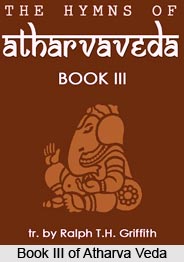 There are thirty one hymns in Book III of Atharva Veda. The first hymn is a prayer for the defeat of enemies in a war. The second hymn is a recension. Next is a prayer for the restoration of a king who was expelled. Fourth hymn is a benediction on election of a king. The succeeding hymn is a prayer of a king to an amulet to strengthen his authority. Next hymn is a prayer for the defeat of the enemies. Seventh hymn speaks of an amulet that that is worn to drive away hereditary disease. Next is the hymn that is chanted in order to get submission, faith and love of relatives. The ninth hymn is a prayer for protection against rheumatism. Next is the prayer for a prosperous New Year ahead
There are thirty one hymns in Book III of Atharva Veda. The first hymn is a prayer for the defeat of enemies in a war. The second hymn is a recension. Next is a prayer for the restoration of a king who was expelled. Fourth hymn is a benediction on election of a king. The succeeding hymn is a prayer of a king to an amulet to strengthen his authority. Next hymn is a prayer for the defeat of the enemies. Seventh hymn speaks of an amulet that that is worn to drive away hereditary disease. Next is the hymn that is chanted in order to get submission, faith and love of relatives. The ninth hymn is a prayer for protection against rheumatism. Next is the prayer for a prosperous New Year ahead
Eleventh hymn is a prayer for speedy recovery of a very sick man. Twelfth hymn is a divine prayer for a house that has been newly built. Again the thirteenth one is a benediction on a water channel. Next is a hymn on benediction on cattle pen. The fifteenth hymn is a merchant`s prayer for success in his business. The sixteenth hymn is a morning prayer of a sage. Seventeenth one is a farmer`s prayer to speed the plough. Next is a jealous wife`s incantation against a rival. Nineteenth hymn is glorification of King`s priest office. The following hymn is a prayer for prosperity in general.
Twenty first hymn is in the honour of Agni in all shapes. It is basically to pacify Agni of the funeral pile in order to satisfy the flames of cremation. Next hymn is regarding the training of an elephant to ride. Twenty third hymn is to assure birth of boys. The following hymn is a harvest song. Twenty fourth is a prayer for man`s love. The hymn hereafter is to win the favour of snakes. Twenty seventh hymn is of the assignment of harming the enemy to the snakes. Twenty eighth hymn is the invocation to change the ill-omened birth of twin calves into a blessing. Twenty ninth hymn speaks of means to obtain resistance from taxation in the next world. Thirtieth hymn is to secure love and concord in a family. The thirty first hymn is praying for speedy recovery of very sick people.



















